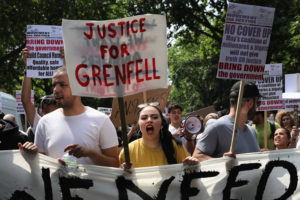Of all the trite statements routinely rolled out by political figures in the aftermath of an atrocity, there is one which is particularly grating: “Lessons will be learned.” It is objectionable not just for its passivity and vagueness, but its lack of truth. We live in an age of inquiries, of ostensible public accountability. The names of otherwise faceless inquisitor-bureaucrats are immortalised in the collective memory: Chilcot, Leveson, Hutton. But all the questions and paperwork don’t change the fact that most lessons are not learned. They are forgotten, some deliberately.
This is worth remembering as the Covid Inquiry embarks on its mammoth investigation. Former prime ministers, chancellors, and, yesterday, the Covid-era health secretary Matt Hancock have taken their oaths of honesty, promising to help us understand what happened and why. As an exercise in modern lesson-learning, it sits on the same shelf as the The Grenfell Tower Inquiry, The Post Office Horizon IT Inquiry, The Undercover Police Inquiry and The Infected Blood Inquiry, all of which have been rumbling away for years now. All have, at times, shown the strength of a statutory public inquiry — its ability to force uncomfortable evidence into the public domain. But all have also demonstrated the fatal weakness of the process. Whatever findings emerge, we still lack the powers to force politicians to do anything to ameliorate their terrible mistakes.
I have spent much of the last four years reporting on the Grenfell Tower Inquiry, which is a perfect illustration of this shortcoming, being in part an investigation into why so many of the inquiries before it were ignored. Parts of the Grenfell tragedy are now fixed in the national-political consciousness, from the cladding which turned the building into a deathtrap, to the governmental bungling of building regulations which allowed its wide use. And so, as our Covid reckoning creaks into action, the appalling chain of state failure over Grenfell provides a painful but useful warning of how far responsible actors can deviate from proper practice — and how difficult it is to force reform.
The story of missed warnings starts in 1999, when the Government was warned of the risks of dangerous cladding on social-housing high rises. Following the death of a pensioner in a cladding fire in Scotland, a select committee of MPs presented a report which said there were potentially hundreds of other buildings around the UK with similar systems. “We do not believe that it should take a serious fire in which many people are killed before all reasonable steps are taken towards minimising the risks,” it said. They called for a rule change to make all cladding systems either entirely non-combustible or proved fire safe by a large-scale test. They also suggested regular monitoring by social housing providers, to ensure the safety of systems already installed was understood.
Neither recommendation was implemented. Behind the scenes, it is now clear there was lobbying against higher standards for cladding — with an industry body warning of “economic consequences for the building industry and the UK as a whole” if tighter standards were imposed. This concern appears to have taken precedence. This is all the more alarming, when you consider that, after the 1999 report, the Government commissioned tests on cladding materials in 2001. In the event, one test had to be stopped after five minutes because it risked setting the laboratory alight. But nothing was done about it. The precise cladding product tested would later find its way onto the walls of Grenfell Tower.
After another fire in 2009, which killed six residents (three of them children), concerns were raised about the advice conveyed by 999 handlers. The residents of Lakanal House, a tower block in south London, had been told to stay put, as a result of the logic that a blaze in a block of flats would stay in the compartment it started in. After the coroner’s inquest in 2013, the fire service promised better training of its call handlers to prevent a repeat tragedy. But this was downgraded amid budgetary pressure and the call centre would go on to repeat the exact same mistake on a much larger scale at Grenfell Tower in 2017.
The Government, meanwhile, was told by the coroner to encourage the retrofitting of sprinkler systems in ageing social housing blocks. But behind the scenes, officials scoffed at these recommendations. They told ministers their legal responsibility demanded they only reply to the coroner’s letter, not “kiss her backside”. The letter, which ultimately went back to the coroner, signed by then-secretary of state Eric Pickles, rejected the recommendation on sprinklers, adding that it had already “encouraged” them following a previous inquiry into a tower block blaze. But nothing happened.
The review of regulatory guidance, meanwhile, was kicked firmly into the long grass. By the time of the Grenfell Tower fire, it had not even started. This meant the opportunity to make a relatively simple tweak to guidance to remove the same outdated standard identified in 2001 was lost. With it remaining in place, unscrupulous cladding companies were able to sell the material — which burns with a similar ferocity to petrol when ignited — for use on more than 450 towers around England. An entirely avoidable disaster was therefore rendered all but inevitable by a simple failure to learn from prior mistakes.
Of course, the fact that we know all this and can openly say it is testimony to the fact that the Grenfell Tower Inquiry has done one part of its job well. It has obtained the documents which show the trail of mistakes which led to the blaze and interrogated the witnesses responsible. No journalist or committee of MPs would ever have got close to the revelations it has brought to light. But the question remains: what is the point if this knowledge does not lead to change? Why drag bereaved families through a tortuous four-year legal process and then let the recommendations rot on a dusty shelf?
Because the savage irony beneath the Grenfell Tower Inquiry’s truth-seeking is that it appears to be headed for the same fate as the ignored warnings it has so assiduously documented. While its final report won’t appear until next year, the inquiry made many recommendations following the publication of its first phase report in October 2019. Crucially, it told the Government to end the total reliance on “stay put” advice in its guidance, and instead require the development of a “Plan B” to get everyone out if a blaze got out of control.
Practically, this was supposed to be achieved through legal obligations on building owners to prepare evacuation plans, install manual alarms which could be activated by firefighters if needed, and make “personal emergency evacuation plans” for disabled residents (who died disproportionately at Grenfell). Boris Johnson promised unequivocally to implement “every recommendation made”. Perhaps unsurprisingly, this promise was quickly forgotten. In April 2020, the Home Office held a behind-closed-doors meeting with industry figures. In it, they slammed the proposals, calling them “not cheap” and “totally impracticable”.
When the government consultation on the implementation was published in the summer, the detail for implementing these key measures had been critically watered down. But this was not made clear. The Home Office press release which announced the abandonment of the recommendation on the evacuation of disabled residents was proudly titled “Home Secretary unveils ambitious plans for fire reform”. But it contained not a single line which made it plain that the recommendation of a seminal, four-year and £170m inquiry was being dropped. If you didn’t already know the detail back-to-front, you would never have known and most of the media didn’t.
And if you want a singular illustration of the weakness of the inquest and inquiry process, consider the death of 23-year-old Emma Waring in 2014. In that instance, the coroner recommended the fitting of sprinklers in flats occupied by residents with particular vulnerabilities. But the government did not even reply to this recommendation, until I submitted a Freedom of Information request seeking its response in 2018. When they finally did, 785 days after the deadline, they still did not accept the recommendation.
All of which suggests the Government cares little for what inquests and inquiries recommend, lending urgency to the launch this week of a campaign for a National Oversight Mechanism — an independent body which would review and report on the Government’s progress in implementing the changes official inquests and inquiries propose. Proposed by the charity Inquest and backed by Grenfell survivors and bereaved and the families of those who died of Covid, such a mechanism would, at least, shine a light on the state’s unwillingness to do what it so blithely promises victims in the aftermath of an atrocity: to learn and apply the lessons from its most deadly mistakes.
None of this is to say that it will solve everything. But as the Covid Inquiry cranks into gear, the very least we can hope is that more people will be paying attention. For unless something changes, history tells us its recommendations will be remembered only when the next disaster strikes, a new inquiry is asked to investigate why the lessons from the last one were ignored, and the whole miserable cycle rolls around again.
Disclaimer
Some of the posts we share are controversial and we do not necessarily agree with them in the whole extend. Sometimes we agree with the content or part of it but we do not agree with the narration or language. Nevertheless we find them somehow interesting, valuable and/or informative or we share them, because we strongly believe in freedom of speech, free press and journalism. We strongly encourage you to have a critical approach to all the content, do your own research and analysis to build your own opinion.
We would be glad to have your feedback.
Source: UnHerd Read the original article here: https://unherd.com/



